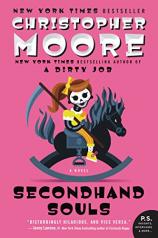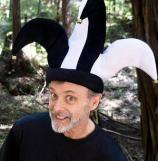Reading Group Guide
Discussion Questions
Secondhand Souls

1. Christopher Moore uses humor to tackle death, violence, suicide, the afterlife, religion, parenting and partnership. Why is it effective?
2. Does the lighthearted tone of SECONDHAND SOULS distract from some of the serious content or draw attention to it?
3. Discuss Moore's use of religion and folklore. He draws heavily from Buddhism, not only in crafting Audrey's character but in having her explain the metaphysics of the novel. He also brings in characters from ancient Egyptian and Celtic belief systems. Do you find this to be a surprising mix? Was it successful?
4. Moore has created a diverse cast of characters. Who did you like the most, and who was the most frustrating to you? Which did you want to know more about? Which could you imagine spending time with and why?
5. What motivates the main characters like Charlie, Audrey, Minty, Lilyand Rivera? Is it a sense of duty? Adventure? Something else? Why take on such dangerous tasks, or were they left no choice?
6. Consider the character of Mike Sullivan: What are his motivations for suicide? Do his actions make sense? As a “beta male,” how is he similar to Charlie Asher?
7. In putting souls into her creations, the Squirrel People, did Audrey remind you of Mary Shelley's Dr. Frankenstein? What do you think her responsibility was to her animated creatures? Were you surprised they rebelled against her?
8. Why was it so important for Lily to be special or have a gift like the other main characters? How would specialness benefit her? When she discovers that she is the only one who can communicate with the ghosts on the bridge, does it change her at all?
9. SECONDHAND SOULS has some unique romances: Minty Fresh and Lily; Charlie and Audrey; Mike Sullivan and Concepcion. Which was most compelling and why? Which relationship was the most romantic, and which challenged the typical understanding of romance or love?
10. How, according to the novel, is love able to transcend death and physicality? Think of the relationships of Charlie and Audrey, and Mike Sullivan and Concepcion, for example. Is this transcendence perhaps Moore's larger point? Or do you think that the setup is just a vehicle for humor? Is there any real connection here between body and soul?
11. Discuss the novel's ending. How does the idea of ghosts pausing on bridges support the view of the universe that the book lays out? Why do you think that bridges, according to the story, are the gathering places of ghosts? Does Moore distinguish between ghosts and souls? If so, how?
12. Many of the Death Merchants in the novel work as actual merchants, selling things like music and books. Why do you think that is?
13. SECONDHAND SOULS is a sequel to A DIRTY JOB. Did you find that the first book was necessary to enjoying and following the second? Or would SECONDHAND SOULS work as a stand-alone novel?
14. SECONDHAND SOULS might be described as a comedy about death, but there is much more to it. How would you explain the book to someone who hasn't read it? What type of reader would you recommend it to and why?








